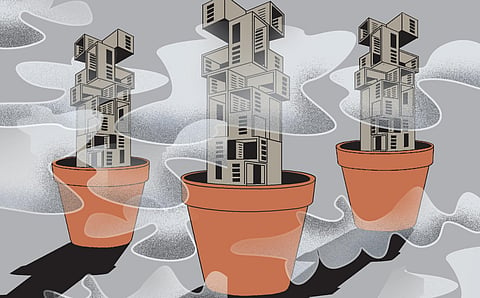

Winter is coming and North India is once again engulfed in a thick veil of smog and controversy. As the smog chokes Indians living in a mega city like Delhi to a slow, painful death, the blame game has begun. According to recent data by the Central Pollution Control Board, air pollution levels have worsened in the country. But it is not just the big cities; small towns and villages are also being choked. Katihar in Bihar had the highest AQI (Air Quality Index) among 163 Indian cities. Uttar Pradesh and parts of West Bengal are also in the grips of pollution.
If one travels through the cities in the Gangetic plains during winters, it is a scene straight out of an apocalypse film. The wheat and paddy fields lay covered in a dim haze. The air is thick with pollution. Fires burn in patches. Humans and beasts covered in blankets emerge out of this haze like zombies. Brick kilns flash by, roads are piled high with garbage and smoke pierces through this thick, oily air, pumping out more fumes. Roadside vegetation is covered with dust and ash. The last three decades have seen a dramatic rise in pollution levels. Studies show that the life span of an average Delhi resident has shortened by 6.3 years, thanks to air pollution. The less we speak of water pollution, the better.
The usual blame game between political parties go on like a charade. It is easy to put the blame on stubble burning. Toxic brew also emanates from major polluters such as vehicles and coal-fired power plants, but the blame is usually reserved for the farmers. Since this is a politically significant issue, it is doubtful that any political party will take action on this in the near future. Since stubble burning happens in a scattered way, it is difficult to stop it by force and the best way to prevent the same is to find an economic solution to the problem. If the farmer finds not burning the stubble is more profitable, the practice will wither away.
There are, however, other major contributors that make the problem so severe; we need to concentrate on them to tackle the menace. Industrial pollution does play a part, but just blaming a few industries is missing the woods for the trees. In theory, we are addressing the industrial pollution like any other developed nation. Our norms are more stringent than many European countries. But we have a very Indian approach in implementing them. We have created a hundred forms and checklists for the pollution control inspectors to fill and impose fine. We have brought back the ‘Inspector Raj’, but it hasn’t added anything to the fight against pollution.
Such norms work in developed nations because they have sorted most of the civic problems, and people behave with a sense of civic duty. They need to only rein in the greedy businessmen. In our country, it becomes an impediment to running business. The big fish always gets away, while minions get choked in the web of complex laws and regulations. We also imitate the developed nations by making our fuel quality stringent, adding significant cost to the consumer. But going by the worsening pollution trend, none of these have helped.
There are other hidden but significant contributors to our pollution woes. One of them is the habit of Indians of burning garbage on the roadside. Such fires in India produce a ‘rainbow’ of toxins due to the variety of organic and plastic material. The construction dust is another major contributor. Every Indian city has builders and developers using the roadside as a dumping yard for their construction material. Their earth movers and cranes plough through the public roads with gay abandon, enveloping the area in a layer of dust. Most of the roadsides are rarely asphalted. The gap between the asphalted road and the pavement or drain is another source of dust. Potholes and broken roads, flyovers and overbridge constructions and road expansions, all add to our pollution.
We need localised solutions. Garbage burning should attract significant fines. The construction industry needs to be held responsible for the local air quality. Stubble burning needs an economic solution. It is an uphill battle and we can’t solve it by cut-and-paste solutions from the West. We can’t be blind to the fact that we are a 140-crore population and if we imitate the devil-may-care attitude of the West, we are doomed as a planet. The problem needs to be tackled at the panchayat, municipal and ward levels. There is no one blanket national solution.
Anand Neelakantan
Author of Asura, Ajaya series, Vanara and Bahubali trilogy
mail@asura.co.in